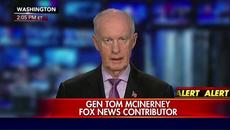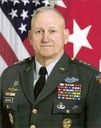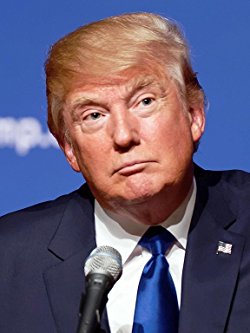Retired military leaders who have been brushed by scandal and even talked about America’s war with Satan are among those backing his campaign.
Trump’s top brass is kind of tarnished.
Among the 88 generals and admirals who endorsed Donald Trump on Tuesday was a commander who once reportedly demanded President Obama produce his birth certificate, an Air Force general who was reprimanded for his role in a deadly 1996 crash, four commanders who were present at one of the biggest scandals in Navy history, and a special forces general known for spilling secrets and trying to turn military campaigns into religious crusades.
To be sure, scores of the signatories had exemplary military records and continue to work in public service. There are Vietnam veterans, three four-star generals and an admiral, as well as key commanders in the U.S. war in Iraq.
“It is a great honor to have such amazing support from so many distinguished retired military leaders,” Trump said in a statement.
But many of the general and flag officers who announced their support for Trump on Tuesday are considered in military circles to be anything but the best and brightest.
Many, in fact, have had brushes with scandals. Four were at the 35th Annual Tailhook Association Symposium in Las Vegas when scores of Navy officers sexually assaulted 83 women and seven men. None of the signatories were charged. One however, was a Navy lawyer in the case.
In 2003, then Lt. Gen. William Boykin, a former head of U.S. Army Special Forces who once was part of the search for Osama bin Laden and perhaps the most recognized name on Trump’s list, sparked an international controversy when during a speech about searching for a Somali warlord, he said: “I knew that my God was a real God, and his was an idol.”
And at the height of the war, he also said that “We’re a Christian nation, because our foundation and roots are Judeo-Christian… and the enemy is a guy named Satan.” Many saw Boykin’s conservative views seeping into his military service. Years later, he received a letter of reprimand for releasing classified information.
Ret. Air Force Maj. Gen. Jeffrey Cliver, another signatory, received a letter of reprimand for the 1996 crash of an Air Force aircraft that killed Commerce Secretary Ronald Brown, for failing to ensure that Air Force units in Europe complied with directives concerning inspection of airports, according to reports at the time.
And Ret. Lt. Gen. Thomas G. McInerney, who was once the number three commander of the Air Force, has long been a reliably conservative commentator on Fox News—so reliable that the Pentagon used him to publicly sell its position on the Iraq war. That earned him a spot on the place in the so-called Pentagon pundits scandal, which was the subject of a Pulitzer-prize winning New York Times expose.
On Tuesday, McInerney defended his decision to sign the Trump letter.
“I feel I have an obligation to the American people to be a part of the discourse and discuss these important national security issues because they are complex, especially on radical Islam. As a nation we have not had it. We have a president that has suppressed it,” McInerney told The Daily Beast.
“I have an obligation because I swore an oath to the Constitution to uphold and defend the nation against all enemies, foreign and domestic,” he added.
In the letter, the generals and admirals argued that the military is weaker because of budget cuts, which they attributed to the Obama administration. They suggested that Democratic hopeful Hillary Clinton was responsible for the hollowing of the force. It’s an odd proposition, given that Clinton ran the State Department, not the Pentagon.
“For the past eight years, America’s armed forces have been subjected to a series of ill considered and debilitating budget cuts, policy choices and combat operations that have left the superb men and women in uniform less capable of performing their vital missions in the future than we require them to be.”
But the military budget grew during the first five years of the administration, only stopping with the Budget Control Act of 2011. In real terms, the base defense budget, that is not including war funding, has dropped by roughly 8 percent since fiscal year 2012. And even Gen. David Petraeus last month argued that such cuts have not hurt military readiness.
McInerney disagreed, saying today’s force has aging planes and ships and few troops since World War II and that Trump’s economic plan will grow GDP, which would “allow us to grow and defend ourselves.”
They also said that change could not happen with a president that “deeply involved with, and substantially responsible for, the hollowing out of our military.” McInerney said Clinton may not have weakened the military but did help sow chaos in the Middle East.
Trump’s list came just a day before NBC holds a commander-in-chief presidential forum, in which both Clinton and Trump will separately answer questions about national security, military affairs, and veterans issues.
Twenty-six of America’s 44 presidents have served in the military, including Gens. George Washington, Ulysses Grant, and Dwight D. Eisenhower. But only in the last 20 years has military endorsement become a staple of the American election cycle. And that has made many still in uniform increasingly uncomfortable, as they believe the military must be prepared to serve any commander in chief, whatever his or her party affiliation.
Several of the officers endorsing Trump on Tuesday have appeared in political discourse before. For example, Ret. Navy Rear Adm. William L. Schachte Jr., who signed Tuesday’s letter, first appeared on the political scene 12 years ago, when he challenged Kerry’s version of how he received the Purple Heart in 1968. At least five of the officers backing Trump signed an August 2015 letter rejecting the Iran deal. Two appear to be foreign policy advisers to the Trump campaign. And in 2012, 25 of Tuesday’s signatories signed a letter endorsing then Republican presidential candidate Mitt Romney.
The collapse of the wall between the military and the campaign has arguably made such signatories open to the kind the of scrutiny private figures receive when they endorse a candidate. Former Afghanistan commander Ret. Gen. John Allen appeared at the Democratic National Convention stage this summer, for example, drawing an unprecedented level of criticism as a recently retired general.
Around the Pentagon, only a handful of the names that appeared on the list were readily recognizable, like Boykin and McInerney. More than anything, there was profound frustration that former commanders keep appearing on the campaign trail, particularly as troops currently serving routinely receive emails that they are not to talk politics.
“Damn it, what the hell is he thinking?” one officer responded when he saw his former commander on the list.
His frustration was not partisan. “They all need to shut up.”
Among the 88 generals and admirals who endorsed Donald Trump on Tuesday was a commander who once reportedly demanded President Obama produce his birth certificate, an Air Force general who was reprimanded for his role in a deadly 1996 crash, four commanders who were present at one of the biggest scandals in Navy history, and a special forces general known for spilling secrets and trying to turn military campaigns into religious crusades.
To be sure, scores of the signatories had exemplary military records and continue to work in public service. There are Vietnam veterans, three four-star generals and an admiral, as well as key commanders in the U.S. war in Iraq.
“It is a great honor to have such amazing support from so many distinguished retired military leaders,” Trump said in a statement.
But many of the general and flag officers who announced their support for Trump on Tuesday are considered in military circles to be anything but the best and brightest.
Many, in fact, have had brushes with scandals. Four were at the 35th Annual Tailhook Association Symposium in Las Vegas when scores of Navy officers sexually assaulted 83 women and seven men. None of the signatories were charged. One however, was a Navy lawyer in the case.
In 2003, then Lt. Gen. William Boykin, a former head of U.S. Army Special Forces who once was part of the search for Osama bin Laden and perhaps the most recognized name on Trump’s list, sparked an international controversy when during a speech about searching for a Somali warlord, he said: “I knew that my God was a real God, and his was an idol.”
And at the height of the war, he also said that “We’re a Christian nation, because our foundation and roots are Judeo-Christian… and the enemy is a guy named Satan.” Many saw Boykin’s conservative views seeping into his military service. Years later, he received a letter of reprimand for releasing classified information.
Ret. Air Force Maj. Gen. Jeffrey Cliver, another signatory, received a letter of reprimand for the 1996 crash of an Air Force aircraft that killed Commerce Secretary Ronald Brown, for failing to ensure that Air Force units in Europe complied with directives concerning inspection of airports, according to reports at the time.
And Ret. Lt. Gen. Thomas G. McInerney, who was once the number three commander of the Air Force, has long been a reliably conservative commentator on Fox News—so reliable that the Pentagon used him to publicly sell its position on the Iraq war. That earned him a spot on the place in the so-called Pentagon pundits scandal, which was the subject of a Pulitzer-prize winning New York Times expose.
On Tuesday, McInerney defended his decision to sign the Trump letter.
“I feel I have an obligation to the American people to be a part of the discourse and discuss these important national security issues because they are complex, especially on radical Islam. As a nation we have not had it. We have a president that has suppressed it,” McInerney told The Daily Beast.
“I have an obligation because I swore an oath to the Constitution to uphold and defend the nation against all enemies, foreign and domestic,” he added.
In the letter, the generals and admirals argued that the military is weaker because of budget cuts, which they attributed to the Obama administration. They suggested that Democratic hopeful Hillary Clinton was responsible for the hollowing of the force. It’s an odd proposition, given that Clinton ran the State Department, not the Pentagon.
“For the past eight years, America’s armed forces have been subjected to a series of ill considered and debilitating budget cuts, policy choices and combat operations that have left the superb men and women in uniform less capable of performing their vital missions in the future than we require them to be.”
But the military budget grew during the first five years of the administration, only stopping with the Budget Control Act of 2011. In real terms, the base defense budget, that is not including war funding, has dropped by roughly 8 percent since fiscal year 2012. And even Gen. David Petraeus last month argued that such cuts have not hurt military readiness.
McInerney disagreed, saying today’s force has aging planes and ships and few troops since World War II and that Trump’s economic plan will grow GDP, which would “allow us to grow and defend ourselves.”
They also said that change could not happen with a president that “deeply involved with, and substantially responsible for, the hollowing out of our military.” McInerney said Clinton may not have weakened the military but did help sow chaos in the Middle East.
Trump’s list came just a day before NBC holds a commander-in-chief presidential forum, in which both Clinton and Trump will separately answer questions about national security, military affairs, and veterans issues.
Twenty-six of America’s 44 presidents have served in the military, including Gens. George Washington, Ulysses Grant, and Dwight D. Eisenhower. But only in the last 20 years has military endorsement become a staple of the American election cycle. And that has made many still in uniform increasingly uncomfortable, as they believe the military must be prepared to serve any commander in chief, whatever his or her party affiliation.
Several of the officers endorsing Trump on Tuesday have appeared in political discourse before. For example, Ret. Navy Rear Adm. William L. Schachte Jr., who signed Tuesday’s letter, first appeared on the political scene 12 years ago, when he challenged Kerry’s version of how he received the Purple Heart in 1968. At least five of the officers backing Trump signed an August 2015 letter rejecting the Iran deal. Two appear to be foreign policy advisers to the Trump campaign. And in 2012, 25 of Tuesday’s signatories signed a letter endorsing then Republican presidential candidate Mitt Romney.
The collapse of the wall between the military and the campaign has arguably made such signatories open to the kind the of scrutiny private figures receive when they endorse a candidate. Former Afghanistan commander Ret. Gen. John Allen appeared at the Democratic National Convention stage this summer, for example, drawing an unprecedented level of criticism as a recently retired general.
Around the Pentagon, only a handful of the names that appeared on the list were readily recognizable, like Boykin and McInerney. More than anything, there was profound frustration that former commanders keep appearing on the campaign trail, particularly as troops currently serving routinely receive emails that they are not to talk politics.
“Damn it, what the hell is he thinking?” one officer responded when he saw his former commander on the list.
His frustration was not partisan. “They all need to shut up.”





 RSS Feed
RSS Feed
